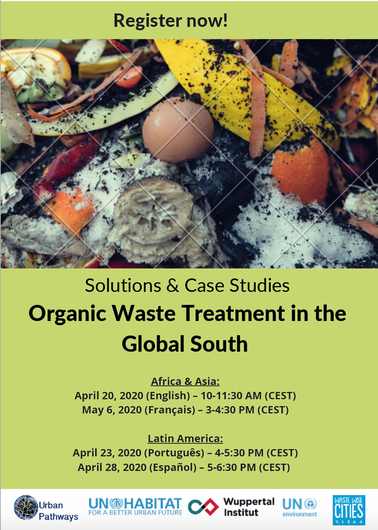Solutions & Case Studies of Cities
Organic Waste Treatment in the Global South
Organic Waste Treatment in the Global South
English: 20th of April 2020; 10 – 11:30 am (CEST)
Portuguese: 23rd of April 2020, 4 – 5:30 pm (CEST)
Spanish: 28th of April 2020, 5 – 6:30 pm (CEST)
French: 6th of May 2020, 3-4:30 pm (CEST)
Portuguese: 23rd of April 2020, 4 – 5:30 pm (CEST)
Spanish: 28th of April 2020, 5 – 6:30 pm (CEST)
French: 6th of May 2020, 3-4:30 pm (CEST)
|
Organic Waste Treatment in Cities of the Global South: Solutions and Case Studies
Webinar Series exploring organic waste treatment options in Africa, Asia and Latin America. The Webinar will be conducted in English, Portuguese, Spanish, and French in order to reach a broad number of officers and professionals of the cities in the respective regions. Urban areas are not only responsible for 80% of energy consumption and 75% of GHG emissions, but also for 2.1 billion tons of municipal solid waste (MSW) generated worldwide each year. In most cities of the Global South, organic waste is the main component of municipal waste, comprising up to 70%. Most of it is deposited in landfills, where it produces methane, an especially powerful greenhouse gas, other gases, bad odors and leachate, contaminating the surrounding environment as well as the quality of life of the residents living around it. Also, the costs for waste management often account for a big share of the local governments’ budget. However, cities have the power to change this and make use of the organic waste! As they are responsible for solid waste management, instead of landfills, municipalities can establish organic waste treatment plans, producing compost, renewable fuel or other products. Experiences show that organic waste treatment provides many rewards at the local level: not only does it help reduce emissions and environmental pollution, but it also contributes to job creation and local agriculture, as well as reducing the costs of waste disposal. In this Webinar, organized by the Wuppertal Institute for Environment, Climate, Energy together with UN-Habitat (Waste Wise City Campaign) under the Urban Pathways project, funded by the International Climate Initiative (IKI) from the German Ministry of Environment, we want to discuss different solutions for organic waste treatment - from municipal composting plants to decentralized systems at neighbourhood level. It aims at discussing and sharing good examples and knowledge on different options among representatives from Latin American, African and Asian municipalities, research institutions, NGOs, and other stakeholders. The webinar will start with an overview of the different solutions, followed by the case studies of different cities of the respective region. The webinar will last 1 hour 30 minutes; please find the registration link for the different Languages and Regions below:
|



